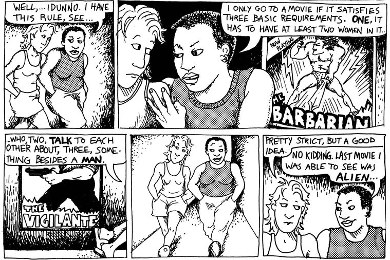A lot of people have difficulty writing members of the opposite sex. The Bechdel Test is a good tool to add to your toolkit.
A fairly good backstory and description can be found here at wikipedia and the basic idea is from this comic.

I’m not going to judge other work. I’m talking about using the idea to improve my own writing. As such, I sidestep some of the issues. Characters in general should have their own names, so that issue is moot. Likewise I take the comic above as, by definition, passing the Bechdel Test itself, so any argument about whether or not men can be mentioned at all is irrelevant. In the comic, ‘a man’ is mentioned. I take the comic as passing itself. Therefore, mere mention of a man isn’t a failure. Again, the idea here isn’t to judge or categorize, but to glance at my own stuff and try to improve it.
So I’ve got two characters, A and B. Specificity is good, so I’m always trying to put names to characters. Alice and Betsy are having a conversation. If they don’t have names, that’s a different issue. The characters have become generic, so I’m going to examine space, wordcount, and so forth to see if I can name them. If I’ve got 1500 words to put the narrator into a house, reveal the house is haunted, and have the haunted house eat the narrator, side characters might be lean. If I’ve got 115k words to do some worldbuilding, A and B should become Alice and Betsy.
Next, I need something for them to talk about that isn’t a man. Most authors, myself included, like to add little bits of cool ideas to the story when we can, and we’re always looking for ways to sneak a bit of texture in without bogging the plot down. Alice and Betsy are a perfect vector for it.
Alice: “Ah, I gotta go to work early tomorrow. I hate it when I have to go to work before sunrise.”
Betsy: “You must hate winter.”
Alice: “I do! It’s terrible! I want to leave Fnordia and move somewhere warm!”
Has a human being in a cold climate not had this conversation? Fnordia gains a little detail, the setting is a little more polished, and it reminds the reader of when the story is occurring.
This can be spiced up.
Alice: “Ah, I gotta go to work early tomorrow. I hate it when I have to go to work before sunrise.”
Betsy: “Why do you have to go in early? I thought you worked afternoon to midnight?”
Alice: “I do, but we’re tracking a new star that appeared in the House of the Crow. I plotted it last year in the House of Endings, so if it is the same star, that’s a bad omen. But the Crow only rises before sunrise this time of year, so guess who has to trek thought the bitter wastes to the get to the observatory before dawn?”
Betsy: “Don’t you take the bus right to the observatory?”
Alice: “And between the bus stop and the observatory is a bitter waste!”
Betsy: “We call that a sidewalk.”
So we have a little more stuff. We have some astrology of made up constellations. We have a bus. We have some character development for Alice and Betsy. We even have a little textured conflict to make the dialogue more real. For only a few hundred words (adding tags, etc.), probably a page after a little description, we’ve gained a lot. It could be longer if it fits into the plot, but it doesn’t have to be.
FYI, above I mentioned a 1500 word story as being prohibitively short. One might think a conversation like that, 133 words as written, could be shoehorned in. It’s actually really hard to do.
Likewise, Adam and Bob can talk about just about anything.
Adam: “What are you doing tomorrow night?”
Bob: “I don’t know. Why?”
Adam: “Want to get drunk and throw expired fireworks into an abandoned mineshaft?”
Bob: “Absolutely!”
There’s plot in there.
Finally, one particular point is that I often write these conversations that get cut. That’s fine. If I know Alice and Betsy like to talk about jackets, how much they hate the cold, and stars, I’ve got a few side details. That sort of backstory can be very useful. Having those bits on hand can make introducing a scene or setting a motivation easier. They’re useful little snippets in their own right.

